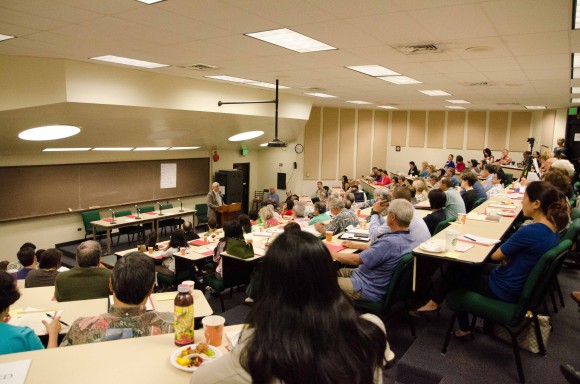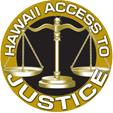
2013 HAWAII ACCESS TO JUSTICE CONFERENCE
AND JUSTICE FOR ALL?
More than 260 people attended the 2013 Access to Justice Conference on Friday, June 21 at the William S. Richardson School of Law at the University of Hawaii. The theme for the fifth annual conference sponsored by the Hawaii Access to Justice Commission was “Justice for All?” Hawaii Supreme Court Chief Justice Mark E. Recktenwald set the stage for the conference with his remarks about justice for all. He remarked, “Justice for all is a noble ideal. But it takes hard work to make sure that ideal is a reality for every person in our community, whatever their background or economic condition.” [His entire speech is noted below.] “Over the past five years, the Hawaii Access to Justice Commission has done extraordinary work to help make the ideal of justice for all more than just a slogan. The Commission has taken the lead in creating partnerships and promoting innovative efforts to help meet the unmet civil legal needs of the most vulnerable members of our community,” said Chief Justice Recktenwald. Professor Charles R. Lawrence, III, Centennial Professor at the law school, stirred the audience with his captivating speech on “Sustaining the Struggle for Justice: Remembering and Renewing Abolitionist Advocacy.” He explained:
Today, as lawyers, we, too often, equate what the law allows with justice. My title intentionally speaks of the Struggle for Justice because I believe in Fredrick Douglass’ admonition that we can never achieve justice without struggle.[i] As the young voices for freedom say today, “No Justice, no Peace.” My title also calls on us to remember and renew our role, and our responsibility, as lawyers, to be abolitionists, to be freedom fighters, to take sides in the struggle for justice.
[Professor Lawrence’s speech is noted below.]
Various concurrent workshops were available to the attendees to select in the afternoon, such as: Restorative Justice in Civil Cases; Micronesians and Access to Justice; “Outside the Box” Thinking: Using Technology and Other Strategies; Access to Justice in the Family Court; Delivery of Legal Services Through Limited Scope Representation; The Role of Mediation in Access to Justice — When, How, and Why?; Language Access and Your Clients; and response to the Legal Problems Faced by Veterans. “Great conference,” “very enjoyable and inspirational,” “best yet!” were just a few of the comments from the attendees.
